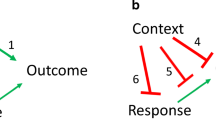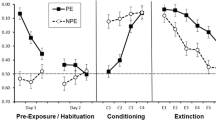Abstract
The behavior of rats given omission training in a water tank apparatus was examined in order to determine if predictable patterns of responding develop in situations where no explicit contingency exists between the specific responses emitted and subsequent removal from cold water. A group of rats given omission relief conditioning was compared with a group given omission nonrelief conditioning. No differences were found between the groups in the acquisition of the omission behaviors or in the temporal patterning of their responses. However, both groups showed consistent and predictable patterns of responding as omission training proceeded. The results suggest that (a) the behavior of organisms is predictable even in situations where no explicit contingencies exist between the specific responses emitted and subsequent reduction of aversi ve stimulation, and (b) the patterns of responding that develop are related to the given stimulus conditions. The findings extend the generality of conclusions generated from appetitive conditioning procedures.
Similar content being viewed by others
Reference Note
ROBERTS, H. 1975. Omission relief: An instrumental conditioning paradigm. Unpublished master’s thesis, Hollins College.
References
AMSEL, A. 1967. Partial reinforcement effects on vigor and persistence. In K. W. Spence & J. T. Spence (Eds.), The psychology of learning and motivation (vol. 1). New York: Academic Press.
AMSEL, A. 1972. Inhibition and mediation in classical, Pavlovian, and instrumental conditioning. In R. A. Boakes & M. S. Halliday (Eds.), Inhibition and learning. London: Academic Press.
ANDERSON, M. C., & SHETTLEWORTH, S. J. 1977. Behavioral adaptation to fixed-interval and fixed-time food delivery in golden hamsters. Journal of the Experimental Analysis of Behavior, 27, 33–49.
GIBBON, J. 1977. Scalar expectancy theory and Webers Law in animal timing’. Psychological Review, 84, 279–322.
KILLEEN, P. 1975. On the temporal control of behavior. Psychological Review; 82, 89–115.
RACHLIN, H., & BURKHARD, B. 1978. The temporal triangle: Response substitution in instrumental conditioning. Psychological Review, 85, 22–47.
SELIGMAN, M. E. P. 1970. On the generality of the laws of learning. Psychological Review, 77, 406–418.
SKINNER, B. F. 1948. Superstition in the pigeon. Journal of Experimental Psychology, 38, 168–172.
STADDON, J. E. R., & AYRES, S. L. 1975. Sequential and temporal properties of behavior induced by a schedule of periodic food delivery. Behaviour, 54, 26–49.
STADDON, J. E. R., & SIMMELHAG, V. L. 1971. The “superstition” experiment: A reexamination of its implications for the principles of adaptive behavior. Psychological Review, 78, 3–43.
WOODS, P. J. 1963. Instrumental escape conditioning in a water tank: Preliminary report. Psychological Reports, 13, 719–722.
WOODS, P. J. 1964. Water tank apparatus for instrumental escape conditioning. Psychological Reports, 14, 167–170.
WOODS, P. J. 1974. A taxonomy of instrumental conditioning. American Psychologist, 29, 584–596.
Author information
Authors and Affiliations
Additional information
This study is based upon a thesis submitted to the faculty of Hollins College in partial fulfillment of the degree of Master of Arts, and was supported by a Faculty Research Grant to P. J. Woods, who supervised the research and whose assistance is kindly acknowledged. The author also thanks Harold Babb for his comments on an earlier draft of the paper.
Rights and permissions
About this article
Cite this article
Matthews, M.D. Effects of Omission Training on The Patterning Behavior of Rats in a Water Tank. Psychol Rec 29, 93–101 (1979). https://doi.org/10.1007/BF03394594
Published:
Issue Date:
DOI: https://doi.org/10.1007/BF03394594




